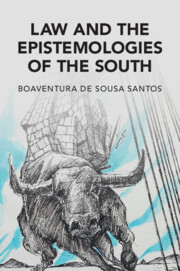Refine search
Actions for selected content:
7 results

Law and the Epistemologies of the South
-
- Published online:
- 07 August 2023
- Print publication:
- 01 June 2023
Nine - Colonial Law and Imperial Law
- from Part Three - The Abyssal Law under the Mode of Abyssal Exclusion
-
- Book:
- Law and the Epistemologies of the South
- Published online:
- 07 August 2023
- Print publication:
- 01 June 2023, pp 239-268
-
- Chapter
- Export citation
Eighteen - Decolonising Justice and Democratic Peace in Colombia
- from Part Five - Real Legal Utopias: Interrupting the Law
-
- Book:
- Law and the Epistemologies of the South
- Published online:
- 07 August 2023
- Print publication:
- 01 June 2023, pp 531-558
-
- Chapter
- Export citation
11 - Valuing and Building on Southern Expertise
-
- Book:
- Teacher Expertise in the Global South
- Published online:
- 18 May 2023
- Print publication:
- 01 June 2023, pp 235-250
-
- Chapter
- Export citation
Five - Introducing the Epistemologies of the South
- from Part Two - Epistemologies of the South and the Law
-
- Book:
- Law and the Epistemologies of the South
- Published online:
- 07 August 2023
- Print publication:
- 01 June 2023, pp 85-117
-
- Chapter
- Export citation
Seven - Is Post-Abyssal Law Possible?
- from Part Two - Epistemologies of the South and the Law
-
- Book:
- Law and the Epistemologies of the South
- Published online:
- 07 August 2023
- Print publication:
- 01 June 2023, pp 158-202
-
- Chapter
- Export citation
3 - Legal Plurality and the Time-Spaces of Law: The Local, the National, and the Global
-
- Book:
- Toward a New Legal Common Sense
- Published online:
- 08 October 2020
- Print publication:
- 01 October 2020, pp 99-120
-
- Chapter
- Export citation
